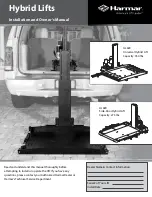
SECTION 2, Page 17
May 2002
SJIII Series E -
The CONVENTIONALS
118931AH
12. Inspect all hoses, fittings, wires, cables, valves,
etc. for leaks, hidden damage and foreign
material.
13A.
On (CE) machines:
Raise the platform, by selecting “BASE” position,
with the Platform/Off/Base Select Switch
, then from the base control station, push the
base Up/Down Toggle Switch to the “
×
×
×
×
×
” (up)
position until there is an adequate clearance to
swing up the safety bar. Return the safety bar to
the storage position
13B.
On ANSI/SIA and CSA machines:
Raise the platform with Up/Down Toggle Switch
from the hydraulic tray, until there is an adequate
clearance to swing up safety bar. Return the
safety bar to storage position.
14. Raise the platform to the maximum extension
height.
Note
Refer to Table 1-1. General Specifications (Section 1)
for raise and lowering times.
15. Fully lower the platform.
Note
A lowering warning system is standard on (CE)
Models. This system automatically stops the lowering
function before reaching the fully retracted position
and sounds an alarm. After the operator has released
the down controls and checked that no person is
near the scissors, the lowering function can reactivate.
These machines also have scissor guards.
16. The SJIII Series Work Platform is now ready for
use by an authorized, qualified operator who
has read and completely understands ALL of
Section 2, OPERATION in this manual.
Prestart Checks
1.
Carefully read and completely understand ALL
of Section 2, OPERATION in this manual and
ALL warnings and instruction labels on the work
platform.
2.
Ensure that there are no obstacles around the
work platform and in the path of travel such as
holes, drop offs, ditches, soft fill or debris.
3.
Check overhead clearances.
4.
Make sure the batteries are fully charged.
Disconnect the AC charger cord from the
external power source.
5.
Make sure all guardrails and lockpins are in place
and locked in position
6.
Make sure both side battery and hydraulic trays
are closed and locked.
7.
Make sure you do not climb or descend a
grade steeper than 25% . Elevated driving must
only be done on firm level surfaces.
Warning
DO NOT OPERATE THIS EQUIPMENT WITHOUT
PROPER AUTHORIZATION AND TRAINING.
DEATH OR SERIOUS INJURY COULD RESULT
FROM IMPROPER USE OF THIS EQUIPMENT!
OPERATOR’S CHECKLIST
INSPECT AND/OR TEST THE FOLLOWING
DAILY OR AT BEGINNING OF EACH SHIFT
1
OPERATING AND EMERGENCY CONTROLS.
2
SAFETY DEVICES AND LIMIT SWITCHES.
3
PERSONAL PROTECTIVE DEVICES.
4
TIRES AND WHEELS.
5
OUTRIGGERS (IF EQUIPPED) AND OTHER
STRUCTURES.
6
AIR, HYDRAULIC AND FUEL SYSTEM(S) FOR
LEAKS.
7
LOOSE OR MISSING PARTS.
8
CABLES AND WIRING HARNESSES.
9
PLACARDS, WARNINGS, CONTROL MARKINGS
AND OPERATING MANUALS.
10 GUARDRAIL SYSTEM INCLUDING LOCKING PINS.
11 ENGINE OIL LEVEL (IF SO EQUIPPED).
12 BATTERY FLUID LEVEL.
13 HYDRAULIC RESERVOIR LEVEL.
14 COOLANT LEVEL (IF SO EQUIPPED).











































